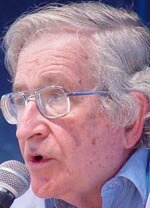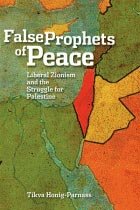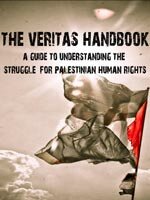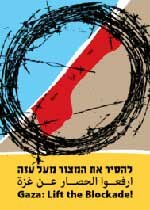A political project is purely utopian unless it can indicate a likely agent – a socio-political force able to realise it and whose long-term interests it would serve. In the present article I propose to apply this precept to the project of the ‘one-state solution’ for resolving the Israeli-Palestinian conflict: the vision of a single democratic (or secular-democratic) state in the whole of so-called ‘historical Palestine’ – the territory of Palestine as it existed under the British mandate from 1923 to 1948.
Moshé Machover
As [the conflict] is caused by colonization, resolution requires decolonization. In this specific case, as the cause is Zionist colonization, what is required is deZionisation, overthrow of the Zionist project and its state.
Watch US secretary of state John Kerry assuming the mantle of our lord: just as JC resurrected Lazarus, JK is about to revive the dead-as-a-doornail talks between the Israeli government and the captive so-called Palestinian ‘Authority’. Though, unlike old Lazarus, this corpse will talk and talk and talk … but will not walk.
Let me start with a proposition that should by now be a matter of general knowledge: the totality of Jews do not constitute a nation in the modern sense of this term; nor have they been a nation in any contemporary meaningful sense for well over 2,000 years.
Zionism is viewed [by Moshé Machover] as a colonial-settler project, not a national liberation movement. Its particular aims, “based not on exploiting the labor of the indigenous people but aiming to exclude and expel them,” are more characteristic of the U.S. model than the South African one. The fact that the Israeli state is not only a product of this settler project, but a force for its extension and expansion, produces the ever-present danger of new ethnic cleansing.
Moshé Machover remembers his friend and comrade, Matzpen co-founder Akiva (Aki) Orr (19 June 1931 – 7 February 2013).
We should never support a war undertaken by our own ruling classes. Often they are undertaken for domestic reasons. Kissinger said of Israel: it has no foreign policy, only domestic policy; and this is actually true of most states – their foreign policies result from internal class contradictions.
A continuous theme in … the book is the view that the Israeli-Palestinian conflict is a confrontation between the Zionist settler-colonialism and the Palestinian Arab people; it’s the last colonial war. Israel is a colonial-settler state, a result of settler colonialism and an instrument for its continuation. If one doesn’t understand this, one understands nothing about the conflict.
If an Arab state west of the Jordan is legitimate, then Zionist colonisation and its state were and are illegitimate. So by acting consistently to prevent a ‘two-state solution’ Israeli governments since 1967 were not behaving impulsively or opportunistically: they have been driven by a deep commitment to the Zionist self-legitimation of Israel itself.
The veteran Israeli socialist, Moshé Machover, has just brought out a wonderful collection of writings, chiefly his own, on the Israeli-Palestinian conflict. It is no exaggeration to say that this book is the best possible introduction to the topic for English-speaking readers. Its inestimable virtue is that it affords a historical overview of the whole Zionist enterprise, without which it is impossible to situate the struggle in any meaningful sense, much less reach a conclusion as to how it might successfully be resolved. Machover does both these things, and the result is a volume which Anglophone socialists must read.
The success or failure of Israel’s onslaught on Gaza can only be judged against the operation’s aims.
[Israel’s current “Pillar of Defence” assault on the Gaza Strip] may serve Netanyahu’s hidden agenda: a protracted regional war may provide a smokescreen for a major ethnic cleansing of Palestinians from the territories occupied by Israel since 1967. This is a long-term plan supported by all major Zionist parties. It is designed to resolve the contradiction between the deep-seated Zionist opposition to the creation of a Palestinian sovereign state, however small, in any part of pre-1948 Palestine, and the even greater “demographic peril”, as it is openly described in Israeli public society, of Arab majority in that land.
In my opinion the whole semantic discussion of Israeli “apartheid” skirts around the fundamental question: the underlying political economy of Zionist colonization.
All the problems in this region stem from the way that the imperial powers France and Britain divided the region after the First World War, to serve their purposes… Syria, Lebanon, and a country called Palestine were created or refashioned. This new country, Palestine, was an invention of British imperialism following World War I; and it was designed explicitly as a domain for Zionist colonization. A whole complex of problems, including the Israeli–Palestinian conflict are a fallout from the fragmentation and parcelization of the Ottoman Empire.
Moshé Machover pre-launched his recently published book, Israelis and Palestinians: Conflict and resolution at a London event (podcast).
Victoria Brittain: “This collection of Moshé Machover’s writings from the mid-1960s to today brings together a coherent and consistent vision of Zionist colonialism and the dispossession and discrimination which have been its hallmarks throughout the whole period. [A] valuable book in its historical reach, accessible style, and forthright debunking of the ‘peace process’ and other lazy myths…”
One thing is beyond any doubt: a major aim of Israel’s foreign policy is the overthrow of the Iranian regime. What is not generally understood are the motives behind this aim, and the present Israeli government’s preferred means of achieving it. Moshé Machover covers the motives and explains why prime minister Binyamin Netanyahu’s preferred means is war – one that is likely to ignite a major conflagration.
Moshe Dayan: Fundamentally, a Palestinian state is an antithesis of the State of Israel… The basic and naked truth is that there is no fundamental difference between the relation of the Arabs of Nablus to Nablus and that of the Arabs of Jaffa to Jaffa… And if today we set out on this road and say that the Palestinians are entitled to their own state because they are natives of the same country and have the same rights, then it will not end with the West Bank. The West Bank together with the Gaza Strip do not amount to a state… The establishment of such a Palestinian state would lay a cornerstone to something else… Either the State of Israel — or a Palestinian state.
For the Israeli leadership, the ‘peace process’ … is a perpetual ratchet mechanism for buying time, while colonisation of Palestinian lands is extended and expanded.
The protest is supported by 90% of Israelis. It is led mainly by students and white-collar workers who are described by the media, somewhat misleadingly, as ‘middle class’. In fact, the demands raised by them indicate that they feel they are being proletarianised, and display solidarity with the poor. The prevailing spirit is that of egalitarianism, self-activity and grassroots direct democracy.
In memoriam: Moshé Machover remembers his close friend, Matzpen co-founder Oded Pilavsky.
There is a genuine problem, and it would be unfortunate to appear callous and uncaring about the fate of those in Benghazi who were penned in and faced the terrible prospect of being massacred… There is world public opinion – civil society – which has real humanitarian concerns, and then there is the so-called ‘international community’, which is the nom de guerre of the US and its followers.
From an unbiased viewpoint, even if it were true that present-day Jews are descended from an ancient people forcibly exiled from Palestine, it would clearly not justify Zionist colonization and the ‘repossession’ of the country after two millennia from its long-standing inhabitants. This is the epitome of hutzpah coming from Zionists, who deny the right of return to the Palestinians they evicted and exiled 62 years ago.
Israel’s strategic aim is to prevent the creation of anything that can even remotely be described as a sovereign Palestinian state; to colonize as much as possible of the best Palestinian lands; and to confine the Palestinians to a series of disconnected enclosures not so much like Bantustans (which were a useful reserve of exploitable labour power for the South-African apartheid regime), but like US Indian reservations, or open prisons. The Gaza Strip has already been converted into the largest prison camp in the world.
[M]ost Israeli leaders genuinely wish for peace – peace on Israel’s terms: their cherished wish is that the Palestinian people, dispossessed and subjugated, should peacefully accept their lot and give up the struggle… The key to a proper understanding of the conflict is that it is an extremely asymmetric one: between settler-colonisers and the indigenous people. It is about dispossession and oppression.
IDF Chief of Staff Lt.-Gen. Gabi Ashkenazi has appointed Maj-Gen (ret.) Giora Eiland to head “external inquest into deadly raid of Gaza flotilla”. Gen. Eiland is the main author of the Dahiya Doctrine of “disproportionate response”, which calls for “the wholesale destruction of the military, government and civilian infrastructure of the enemy entity”.
[P]rotected by a Western empire, you colonize a part of the world, ethnically cleanse as many of its indigenous people as you can, and confine the remainder to stew in a series of besieged reservations, which are in effect open prisons. And when the victims try to resist, you depict them as “savages” and “terrorists”; and present yourself, the colonizer, as acting in “self-defence”. Similarly, when humanitarian sympathizers of the colonized try to provide them with some help.
“The most important task for us, expatriate Israeli dissidents, is educational – in the broad sense of the word. When I first came to the UK, not only general public opinion, but even much of the radical left, was very sympathetic to Israel. We had a tremendous job educating the left on the true nature of Zionism as a colonizing project and Israel as an expansionist settler state.”
[The] main theses are two sides of one medal:
1. In Israel the struggle for socialism must be part of a regional struggle; and it necessarily implies a struggle to overthrow Zionism.
2. Conversely, a defensive struggle against the worst effects of Zionism can be waged on its own as a series of one-issue campaigns, by single-issue groupings; but Zionism cannot and will not be overthrown in this way. It can only be overthrown as part of a socialist transformation of the entire region, the Arab East. And it requires an organization set up according to this strategy.
In recent months there is a growing tendency among opponents of Israeli oppression and defenders of Palestinian rights to refer to Israeli policy towards the Palestinians as “apartheid”… I would like to warn against an unthinking use of this misleading analogy between Israeli policy and that of the defunct apartheid regime in South Africa. It is theoretically false and politically harmful.
IOA Editor: This very important discussion of the similarities and differences between the Occupation and Apartheid, originally published in 2004, is again timely, in view of recent commentaries, including on the IOA.
Arab and Israeli socialists have a special historical responsibility. A revolution does not happen by itself; and when it does break out it can take a disastrous turn if it is hijacked by regressive forces. In order to ensure that an Arab revolution can resolve the Israeli-Palestinian conflict in the benign way envisaged here (along with the other great problems of the region), we must start working and organising now in a democratic and non-sectarian way. We must closely coordinate our thinking, strategy and activity; and form organisational links on a regional scale, prefiguring the future in the present.
How should we think about the Israeli–Palestinian conflict? Please note: how comes before what. Before coming to any substantive conclusions – certainly before taking sides – we must be clear as to how the issue ought to be approached. It would be a mistake to start in normative mode. A moral value judgment must be made: I would certainly not advocate avoiding it. But we must not start with moral value judgments. Assigning blame for atrocities is not a good starting point. In any violent conflict, both sides may – and often do – commit hideous atrocities: wantonly kill and maim unarmed innocent people, destroy their homes, rob them of livelihood. And of course all these atrocities must be condemned.





































